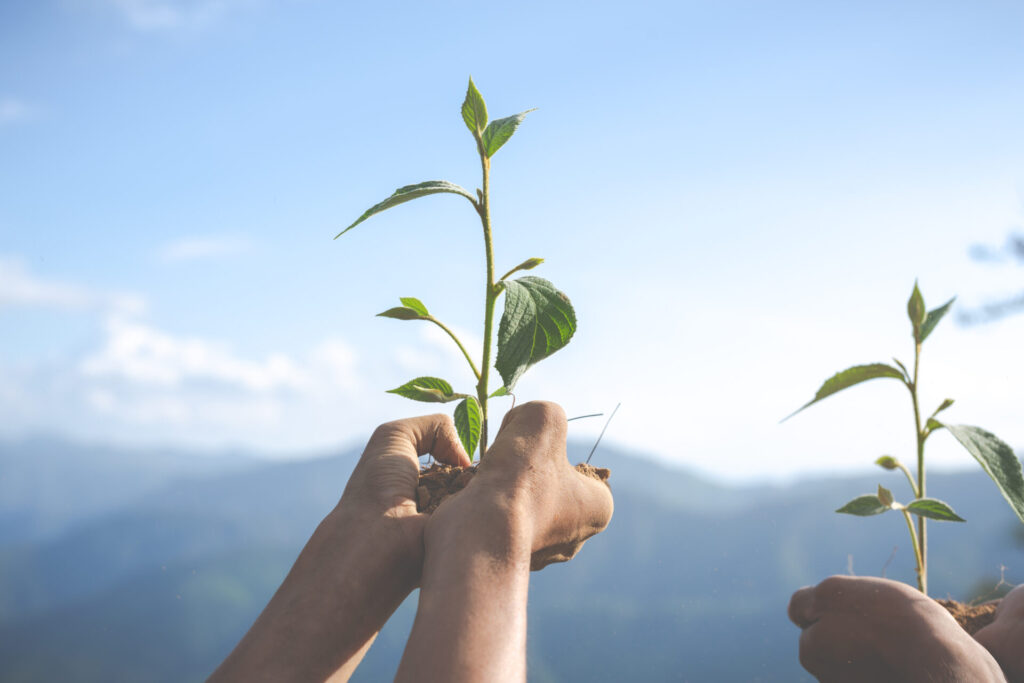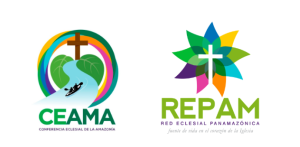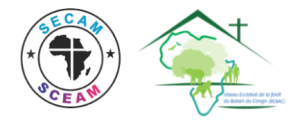
Biodiversity is usually understood in terms of the great variety of plants, animals, and microorganisms. Still, it also includes genetic differences within each species, for example, between crop varieties and livestock breeds, and the variety of ecosystems (lakes, forests, deserts, agricultural landscapes) that host multiple interactions between their members (humans, plants, animals).
Biodiversity is declining worldwide. Loss of natural habitats due to deforestation, climate change, river, soil, and air pollution, and invasive species are among the leading causes. Land clearing and land use for agriculture and other purposes affect soil and water quality. Approximately one-third of the world’s soil is degraded; this figure could rise to 90% by 2050, while demand for food is expected to increase by 60%. The goods provided by nature are indispensable for human life, security, and well-being. Among the eighteen regulating ecosystem services identified by the UN are air and water quality, climate regulation, soil formation and maintenance, and pollination.
Since on this Earth, “everything is interconnected,” the latest IPCC report notes that due to anthropogenic global warming, rapid and widespread changes have occurred in the atmosphere, oceans, cryosphere, and biosphere. Human-induced climate change is already affecting many extreme weather and climate events in all regions of the planet. This has resulted in widespread adverse impacts and related losses and damages to nature and people.
In line with scientific evidence, Pope Francis reminds us that “climate is a common good, belonging to all and for all. At the global level, it is a complex system related to many conditions essential for human life. There is a very consistent scientific consensus that indicates that we are facing a worrying warming of the climate system.” Moreover, the Holy Father points out that climate change creates “a vicious circle that aggravates the situation even more, affecting the availability of essential resources such as drinking water, energy, agricultural production in warmer regions, leading to the extinction of part of the planet’s biodiversity… Things are even worse because of the loss of tropical forests that would otherwise help mitigate climate change”.
Thus, Africa and Latin America in the Global South are more united than ever by sharing “those lungs of the planet full of biodiversity that is the Amazon and the Congo river basin,” important places “for the entire planet and the future of humanity.” The Amazon and the Congo represent the largest carbon sink on the planet.
In “Querida Amazonía” [Dear Amazon], Pope Francis delved into the climate-regulating role of global tropical forest biodiversity. “The planetary balance also depends on the health of the Amazon. Together with the Congo and Borneo biomes, it dazzles with the diversity of its forests, on which rain cycles, climate balance, and a great variety of living beings also depend. It functions as a great carbon dioxide filter, which helps to prevent global warming.”
The integral ecology perspective proposed in the Social Doctrine of the Church invites us to appreciate the complexity of the ecological crisis and its multiple causes so that the transformation of reality cannot have a single perspective. “If we want indeed to build an ecology that allows us to heal all that we have destroyed,” “it is necessary to turn to the diverse cultural riches of peoples, to art and poetry, to the interior life and spirituality.”
In December 2022, 196 countries in the UN signed the Kunming-Montreal Global Biodiversity Framework, promising to “live in harmony with nature” by 2050 and to “halt and reverse biodiversity loss” by 2030. This kicked off plans by nations to address biodiversity loss and secure our common home, which we welcome.
This year’s theme for Biodiversity Day was “From Agreement to Action: Build Back Biodiversity,” which instils hope that we can do better to solve the ecological crisis raging in the Amazon and the Congo. In the latter, an area of rainforest larger than that of Bangladesh has been lost in recent years, and while researchers have described subsistence agriculture as a major driver of this situation, large-scale resource extraction, such as mining, logging, and oil and gas development, play a major role in driving deforestation.
It is also appalling that one of the key countries in the Congo basin, the Democratic Republic of Congo (DRC), intends to open up protected areas and forested peatlands to oil and gas exploitation, which is a setback to the achievement of the agreement. Needless to say, if these peatlands are disturbed, the consequences for the rainforest and the global climate will be dire, and local and indigenous communities will be severely affected.
This is supported by a statement issued by the Symposium of Episcopal Conferences of Africa and Madagascar (SECAM) urging governments to take immediate and ambitious action to protect the diversity of creation. It stresses, “A key aspect to keep in mind is that the Congo biome not only contributes to the health of the Earth but works in tandem with other biomes such as the Amazon; the Congo sustains the balance of our sister mother, Earth.”
Pope Francis‘ apostolic visit to the DRC in January 2023 raised the prophetic voice of the Church, crying out that “after political colonialism, an equally enslaving ‘economic Colonialism’ has been unleashed,” thus going to the human root of the ecological crisis. He also addressed the international community: “Do not touch the Democratic Republic of Congo, do not touch Africa. Stop suffocating it because Africa is not a mine to be exploited or a land to be plundered. Let Africa be the protagonist of its destiny”. Our territories and communities deserve respect and to be heard; they deserve space, freedom, and attention in the global community.
In the African context, Fridolin Cardinal Besungu Ambongo, the Archbishop of Kinshasa and President of SECAM, exhorts:
“A lot of people in Africa are largely dependent on access to land, natural reserves, and ecosystem services for their means of subsistence. lt is also recognised that many intensive forms of exploitation and environmental degradation not only deplete the land and resources needed to sustain communities’ livelihoods but also undermine the social structures that shape their cultural identity and meaning of life. The way humanity treats the environment influences the way it treats itself, and vice versa. The throwaway culture affects the excluded just as it reduces things to waste. Every violation of solidarity and civic friendship harms the environment and affects the entire planet”.
In the Latin American context, Monsignor Adalberto Jimenez, bishop of the Amazon in the Apostolic Vicariate of Aguarico and president of REPAM Ecuador, denounces:
“We are destroying the common home criminally, all the life of the flora of the fauna of the peoples that inhabit the Amazon. This destruction comes at the hands of human beings… This destruction has a name through the multinationals. Oil extraction is very dirty and polluting… There have been more than a thousand oil spills in ten years, only in the Amazon of Ecuador. We are facing illegal mining that is destroying the clean water sources of the Amazonian rivers. We are facing the deforestation of ancient trees falling under logging companies. Before the eyes of so many of us, nature is being destroyed, and that is why I make this call for all of us to make a personal commitment and a social commitment, also a Christian commitment to defend this common home”.
The prophetic voice of the pastors in Amazonia, in the words of Cardinal Pedro Barreto Jimeno, President of the Ecclesial Conference of the Amazon (CEAMA), can be regarded as a“moral call to all societies – and especially to the States that should defend and promote the common good – to stop the destruction of the Biological Diversity in the Amazon and to respect every present and future person. This can only be achieved with stability, security, and social peace, which are achieved through special attention to intergenerational distributive justice, to definitively abandon the extractivist model and achieve the transition towards an integral, sustainable, and just human development”.
This implies that there is a need to promote a culture of care to overcome a throwaway culture, seeking the conservation of places immensely rich in biodiversity and through an economy with a soul, an economy inspired by St. Francis of Assisi, creating jobs and income-generating activities that preserve the environment and help people escape poverty. “In other words, there can be no real ecological approach and concrete work to safeguard the environment without the integration of a social justice that grants the right to the common destiny of the earth’s goods for current as well as future generations.”
For this reason, preserving this green belt that extends along the line of the Equator, from the Amazon, passing through the Congo and reaching Indonesia, on the Island of Borneo, refers to a fundamental change of attitude and to a turn of spirituality that gives meaning to life, understanding this intimate connection between the cry of our sister Mother Earth and the cry of the poorest, to restore biodiversity through a synodal dynamic that is weaving networks in the territories. “Everything is connected, and this invites us to mature a spirituality of global solidarity that springs from the mystery of the Trinity.”
The example of a Church on the move, capable of articulating an organic and holistic pastoral, as is gradually being achieved by REBAC in the Congo Basin, REPAM, and CEAMA in the great Amazon biome, summons us to incarnate the four dreams that the Pope raises in the Post Synodal Exhortation “Dear Amazonia” in each of the territories of our common home so that we find new paths for the Church and towards an integral ecology. With REMAM in Mesoamerica, REGCHAG in the Latin American Southern Cone, and RAOEN in Oceania, it is possible to promote ecological citizenship that recovers the polychromy of biodiversity and celebrates a new Pentecost in which people of various geographical origins can understand each other with the language of love and enjoy the gift of peace as a sign of the presence of the Spirit that renews the face of the earth and our hearts.
t is unequivocal that nations must have good intentions in addressing biodiversity loss and work together to protect our common home. Pope Francis, in his encyclical Fratelli Tutti, reminded us that “no authentic, profound and stable change is possible unless it takes place based on diverse cultures, especially those of the poor. A cultural pact implies renouncing a monolithic understanding of the identity of a place. It demands respect for diversity by offering it ways of promotion and social integration”.
Let us sow the vocation of forming a community composed of brothers and sisters who reciprocally welcome and care for one another to reforest, restore and protect the diverse landscapes that move us to praise the Triune God, “a precious community of infinite love” with the tender and responsible care of his creation which we are all part of.
Authors:
“Réseau Ecclésial de la Forêt du Bassin du Congo” (REBAC) and “Red Eclesial Panamazónica” (REPAM), with quotes from Fridolin Cardinal Besungu Ambongo, Archbishop of Kinshasa in the Democratic Republic of Congo (DRC), President of the Symposium of Episcopal Conferences of Africa and Madagascar (SECAM), and Pedro Cardinal Barreto Jimeno, Archbishop of Huancayo, Peru, and President of the “Conferencia Eclesial de la Amazonía” (CEAMA), and of Mon. Adalberto Jimenez, bishop of the Amazon in the Apostolic Vicariate of Aguarico, Ecuador, and president of REPAM Ecuador.







